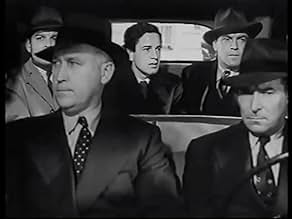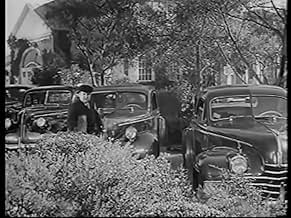Füge eine Handlung in deiner Sprache hinzuThe son of a murderer is entangled in his father's crimes and is sentenced to a rehabilitive farm, where he learns a new way of life.The son of a murderer is entangled in his father's crimes and is sentenced to a rehabilitive farm, where he learns a new way of life.The son of a murderer is entangled in his father's crimes and is sentenced to a rehabilitive farm, where he learns a new way of life.
- Regie
- Drehbuch
- Hauptbesetzung
King Baggot
- Man in Bank
- (Nicht genannt)
William Bailey
- Man in Courtroom
- (Nicht genannt)
Empfohlene Bewertungen
The cast is pretty top-notch for its time, with two great character actors, Edward Arnold and Lionel Barrymore. Gene Reynolds, as Arnold's smart aleck son, gives a fine performance too. As expected, Lionel steals every scene he's in, and this is one of several films disproving the widely reported myth that Lionel was confined to a wheelchair and never filmed standing again after 1938.
The supporting cast, including Robert Sterling, Marsha Hunt, and a nasty goose named Charlie, all have their moments, but the success of the film hinges on the talents of Reynolds, Arnold and Barrymore.
The climactic scene in which Barrymore and Arnold face off is pretty neat, given the caliber of these two old pros.
The film remains engaging and enjoyable throughout, and the occasional lapses into sentimentality and corniness are easily forgivable. Though not one of the "great" films of the era by any stretch, and more of a B-picture overall, it's still a good, little-known '40's gem.
The supporting cast, including Robert Sterling, Marsha Hunt, and a nasty goose named Charlie, all have their moments, but the success of the film hinges on the talents of Reynolds, Arnold and Barrymore.
The climactic scene in which Barrymore and Arnold face off is pretty neat, given the caliber of these two old pros.
The film remains engaging and enjoyable throughout, and the occasional lapses into sentimentality and corniness are easily forgivable. Though not one of the "great" films of the era by any stretch, and more of a B-picture overall, it's still a good, little-known '40's gem.
"The Penalty" is really about the character played by Gene Reynolds. It's a role similar to the one he had in "The Get-Away," another excellent film. He was a fascinating, intense young actor. He was sort of a teen-aged John Garfield. (I understand that the actor went on to win numerous Emmys producing for television. That's fine. Who knows how he would have matured and what sort of roles, if any, he would have got had he remained with acting.) The movie begins with the fine Edward Arnold in his usual genial manner. He is hiring men for a job, assuring them in a fatherly manner that they'll be paid well. But quickly we see that they are being hired as his stooges for a bank robbery. And that he yes, is fatherly: He is the father of the Reynolds character, who worships him.
Arnold plays one bitter, nasty guy. And he's teaching his son to be as cold and cynical as he is. His girl friend, played by the entertaining Veda Ann Borg, may not worship him. But she worships the furs and other finery his ill-gotten money buys her.
The bulk of "The Penalty" takes place on a farm where Reynolds is sent while dad is on the lam. No more about the plot other than to mention the people in this new home: Robert Sterling is excellent as the farmer. Marsha Hunt is appealing as his lady friend, the local schoolteacher. Lionel Barrymore is her father. As he often did, he plays variations on his standard persona: When he's talking about young Reynolds or young Sterling, he could as easily be speaking of young Dr. Kildaire.
The movie has a little of everything: It's exciting and suspenseful. It's funny at times. And it's sad. I recommend it very highly.
Arnold plays one bitter, nasty guy. And he's teaching his son to be as cold and cynical as he is. His girl friend, played by the entertaining Veda Ann Borg, may not worship him. But she worships the furs and other finery his ill-gotten money buys her.
The bulk of "The Penalty" takes place on a farm where Reynolds is sent while dad is on the lam. No more about the plot other than to mention the people in this new home: Robert Sterling is excellent as the farmer. Marsha Hunt is appealing as his lady friend, the local schoolteacher. Lionel Barrymore is her father. As he often did, he plays variations on his standard persona: When he's talking about young Reynolds or young Sterling, he could as easily be speaking of young Dr. Kildaire.
The movie has a little of everything: It's exciting and suspenseful. It's funny at times. And it's sad. I recommend it very highly.
Slick B picture from MGM starring two of the all-time greats, Edward Arnold and Lionel Barrymore. Arnold plays the humorously named criminal Stuff Nelson, who has an even more humorously named son, Roosty (Gene Nelson). After he's captured, Roosty is sent to work on a farm. Eventually Stuff comes looking for his stuff and the boy must choose between a life of crime or a life on the farm.
Barrymore and Arnold are top notch as anyone familiar with their work might expect. Sadly Barrymore isn't in this as much as I would have liked. I would have preferred he run the farm instead of Robert Sterling, but I suppose that would have changed the ending some. Gene Nelson does fine with the part he's given, which is pretty corny. Richard Lane takes a break from harassing Boston Blackie to play the investigator hot on Arnold's trail. Marsha Hunt has a thankless role as Sterling's girlfriend. Features one of the cleverest bank robberies ever filmed. I'm not saying I would ever rob a bank but if I did this is how I would want to do it. One final thing, I love the movie poster. Talk about a lost art form.
Barrymore and Arnold are top notch as anyone familiar with their work might expect. Sadly Barrymore isn't in this as much as I would have liked. I would have preferred he run the farm instead of Robert Sterling, but I suppose that would have changed the ending some. Gene Nelson does fine with the part he's given, which is pretty corny. Richard Lane takes a break from harassing Boston Blackie to play the investigator hot on Arnold's trail. Marsha Hunt has a thankless role as Sterling's girlfriend. Features one of the cleverest bank robberies ever filmed. I'm not saying I would ever rob a bank but if I did this is how I would want to do it. One final thing, I love the movie poster. Talk about a lost art form.
But all his acting abilities are given short shrift by a tale that purports to be a crime melodrama with EDWARD ARNOLD as his father, a bank robber who's always one step ahead of the police. RICHARD LANE is the detective on his trail, VEDA ANN BORG is Arnold's moll girlfriend, GENE REYNOLDS is his street smart son, and RALPH BYRD is an unfortunate police officer.
Trouble is, none of the story rings true. It all his a very fabricated MGM look, the kind of programmer they turned out to fill a double feature program without any headliners in starring roles. I never bought jovial EDWARD ARNOLD as the criminal type and this bit of miscasting prevents the story from any real sense of credibility.
It's a good forty minutes before ROBERT STERLING and MARSHA HUNT show up as a farm couple willing to take reform school reject GENE REYNOLDS under their wing. He's a fallen sparrow who needs all the nurturing they can give.
Fifty minutes into the story, LIONEL BARRYMORE and GLORIA DE HAVEN show up, with Barrymore as a Grandpa who smokes a pipe and talks like Dr. Gillespie except that he's full of kindly sentiments instead of bitter complaints about mankind.
Did I say the story was dated? Marsha Hunt talks about a schoolteacher making $85 a month.
Summing up: Unpredictable at the start, the story soon turns into a conventional "crime doesn't pay" drama with Reynolds doing a complete reformation in time for a happy ending. The only saving grace is that it's not as preachy as it might have been.
Summing up: The faults far outweigh the virtues.
Trivia note: Watch for PHIL SILVERS (without specs) in a one minute bit as a hobo.
Trouble is, none of the story rings true. It all his a very fabricated MGM look, the kind of programmer they turned out to fill a double feature program without any headliners in starring roles. I never bought jovial EDWARD ARNOLD as the criminal type and this bit of miscasting prevents the story from any real sense of credibility.
It's a good forty minutes before ROBERT STERLING and MARSHA HUNT show up as a farm couple willing to take reform school reject GENE REYNOLDS under their wing. He's a fallen sparrow who needs all the nurturing they can give.
Fifty minutes into the story, LIONEL BARRYMORE and GLORIA DE HAVEN show up, with Barrymore as a Grandpa who smokes a pipe and talks like Dr. Gillespie except that he's full of kindly sentiments instead of bitter complaints about mankind.
Did I say the story was dated? Marsha Hunt talks about a schoolteacher making $85 a month.
Summing up: Unpredictable at the start, the story soon turns into a conventional "crime doesn't pay" drama with Reynolds doing a complete reformation in time for a happy ending. The only saving grace is that it's not as preachy as it might have been.
Summing up: The faults far outweigh the virtues.
Trivia note: Watch for PHIL SILVERS (without specs) in a one minute bit as a hobo.
A very good film, with actors ranging from Lionel Barrymore to Edward Arnold, but this film really hinges on the acting ability of Gene Reynolds. Mr. Reynolds dominates this film and for a teen actor, he carries the film very well. I found this film to be very good and really kept this viewer's attention from beginning to end. Be sure and catch this film the next time it is on television--another "small" film that is worth seeing!!
Wusstest du schon
- WissenswertesThe police in this film use the 1928 model Thompson sub-machine gun with a 50 round drum magazine while the bad guys use the BAR (Browning Automatic Rifle). Bonnie and Clyde were known for using the BAR in their criminal exploits. Unlike the Thompson which uses a pistol round, the BAR uses a rifle round with extreme penetrating power. The BAR was also used by American machine-gunners in WWII.
- PatzerWhen Roosty pulls the black car over after crossing the bridge, reflections of multiple studio lights can be seen on the car's highly polished door.
Top-Auswahl
Melde dich zum Bewerten an und greife auf die Watchlist für personalisierte Empfehlungen zu.
Details
- Laufzeit
- 1 Std. 20 Min.(80 min)
- Farbe
- Seitenverhältnis
- 1.37 : 1
Zu dieser Seite beitragen
Bearbeitung vorschlagen oder fehlenden Inhalt hinzufügen


































